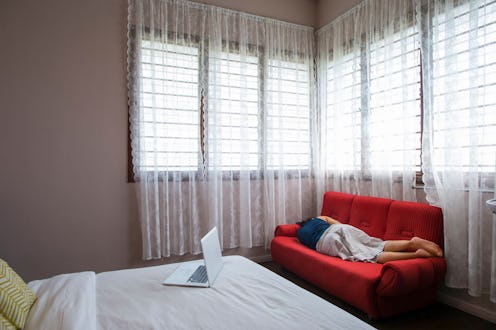Life
Here's What You Can Actually Expect When You Visit Your GP About Depression

People in the UK are starting to get a lot better at talking about mental health, which is brilliant. But one thing a lot of people aren't so hot on, is actually going to the GP for help if they're feeling low. Many feel too uncomfortable to book an appointment because they simply just don't know what to expect — except the worst. But actually, when you go to a doctor about depression, you kick start an incredibly important process of self-care — one that your future self will thank you for.
In England, according to NHS figures, one in four people experience mental health problems each year. A 2014 report from the Adult Psychiatric Morbidity Survey (APMS), meanwhile, revealed that one in six people suffer with anxiety or depression every week. So firstly, let me say that you are seriously not alone. In fact, a 2017 survey from the Varkey Foundation revealed the mental wellbeing of British millennials to be among the worst in the world. It's time we did something about that.
As reported by the NHS, the causes of depression range from genetic predisposition to abuse, traumatic incidents, a major lifestyle event, and other medications. Even hormones can be to blame. So why do we struggle to talk about it? Dr. Natasha Bijlani, consultant psychiatrist at the Priory’s Roehampton Hospital in London, tells me: "Mental health disorders do sadly seem to be quite stigmatised in our society. However, with improved attention in the media and education in general, hopefully societal attitudes are changing."
Initiatives like Heads Together, which is spearheaded by the Duke and Duchess of Cambridge together with Prince Harry, are an important step towards creating that attitude shift.
You can book an appointment to discuss a mental health problem like you would for any other health problem. Simply call your surgery and ask for the next available slot. With many NHS clinics, this means calling at opening time and asking for a same day appointment. Remember that you don't have to disclose the reason for the appointment to the receptionist if you don't want to. If you feel like you'd prefer longer to discuss your symptoms, you can also ask for a double appointment.
"If you seek help from your doctor about depression, your doctor will ask you questions, hopefully in a sympathetic manner," Dr. Bijlani explains of that first appointment. "The questions will explore whether or not you have any possible triggers for your symptoms, as well as details about their nature and severity."
Your GP will also ask you to fill out a questionnaire or describe your symptoms, and it might be helpful for you to write these down in advance so you don't forget to mention something important in the moment. These are different for everyone, but may include low mood, anger, irritability, lack of enjoyment of normal pleasurable activities, anxiety, disturbed sleep, and appetite changes, as well as changes in concentration, energy, and libido.
Dr. Bijlani also adds: "You will be asked about any thoughts of self-harming or suicide so that appropriate actions can be taken to ensure your safety."
Once your doctor has more information about your symptoms, they will make a diagnosis. Given that symptoms of depression and anxiety can arise for a variety of reasons, the doctor might suggest testing you for something seemingly unrelated. Remember, mental health and physical health are closely connected, and your low mood might be caused by something totally unexpected, like your thyroid function, which the NHS reports as causing depression.
If your doctor diagnoses depression, they will then begin discussions about your treatment plan. You might find it helpful to be clued up about your options in advance, but it is by no means necessary. Dr. Bijlani continues:
"The evidence base for treating mild depressive disorder is different from that recommended for managing moderate or severe cases. Mild depressive disorder usually responds well to talking treatment — psychotherapy, counselling — and does not usually require antidepressant medication, which is far more effective in combination with psychotherapy in moderate or severe cases."
If the doctor prescribes anti-depressants, it's important to remember that just because you start to feel better, you shouldn't stop taking them earlier than recommended. In fact, Dr. Bijlani advises, "If medication is prescribed, it is important to see your doctor for regular reviews so they can assess your response and advise you regarding possible side effects."
When you start talking possible treatment options, you may find it beneficial to talk to your doctor about how they work in order to grow your understanding of their benefits. "Antidepressants change the availability of chemicals in the brain that are known to affect mood, and talking treatments or psychotherapy enables the individual with depressive symptoms to learn to change the way they think, which can change the way they feel, and then change the way they behave," says Dr. Bijlani.
"There are different kinds of talking treatments but cognitive behaviour therapy is usually the most effective as it provides practical, structured guidance with managing the symptoms."
One thing Dr. Bijlani stresses is that the prognosis for first episode depressive disorder is usually very good when treatment is properly provided. That said, depressive episodes can recur, and the sooner you seek professional help, the better.
It's often useful to remember that living with depression is common and people have rich, fulfilling lives alongside it. Reaching out for assistance by seeing your GP can be an empowering first step on your road to recovery. Charities such as Depression Alliance and The Centre for Mental Health are also helpful, as is mental health charity Mind. If you need someone to talk to confidentially about your mental health, or if you're worried about someone else, call the Samaritans helpline on 116 123.